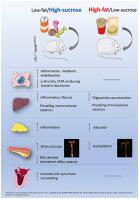当前位置:
X-MOL 学术
›
Atherosclerosis
›
论文详情
Our official English website, www.x-mol.net, welcomes your
feedback! (Note: you will need to create a separate account there.)
Dietary sucrose induces metabolic inflammation and atherosclerotic cardiovascular diseases more than dietary fat in LDLr ApoB100/100 mice
Atherosclerosis ( IF 4.9 ) Pub Date : 2020-07-01 , DOI: 10.1016/j.atherosclerosis.2020.05.002 Laís R Perazza 1 , Patricia L Mitchell 1 , Benjamin A H Jensen 2 , Noëmie Daniel 1 , Marjorie Boyer 3 , Thibault V Varin 1 , Rihab Bouchareb 3 , Renato T Nachbar 3 , Michaël Bouchard 4 , Mylène Blais 4 , Andréanne Gagné 3 , Philippe Joubert 3 , Gary Sweeney 5 , Denis Roy 6 , Benoit J Arsenault 3 , Patrick Mathieu 3 , André Marette 1
Atherosclerosis ( IF 4.9 ) Pub Date : 2020-07-01 , DOI: 10.1016/j.atherosclerosis.2020.05.002 Laís R Perazza 1 , Patricia L Mitchell 1 , Benjamin A H Jensen 2 , Noëmie Daniel 1 , Marjorie Boyer 3 , Thibault V Varin 1 , Rihab Bouchareb 3 , Renato T Nachbar 3 , Michaël Bouchard 4 , Mylène Blais 4 , Andréanne Gagné 3 , Philippe Joubert 3 , Gary Sweeney 5 , Denis Roy 6 , Benoit J Arsenault 3 , Patrick Mathieu 3 , André Marette 1
Affiliation

|
BACKGROUND AND AIMS
Poor dietary habits contribute to the obesity pandemic and related cardiovascular diseases but the respective impact of high saturated fat versus added sugar consumption remains debated. Herein, we aimed to disentangle the individual role of dietary fat versus sugar in cardiometabolic disease progression. METHODS
We fed pro-atherogenic LDLr-/-ApoB100/100 mice either a low-fat/high-sucrose (LFHS) or a high-fat/low-sucrose (HFLS) diet for 24 weeks. Weekly body weight gain was registered. 16S rRNA gene-based gut microbial analysis was performed to investigate gut microbial modulations. Intraperitoneal insulin (ipITT) and oral glucose tolerance test (oGTT) were conducted to assess glucose homeostasis and insulin sensitivity. Cytokines were assessed in fasted plasma, epididymal white adipose tissue and liver lysates. Heart function was evaluated by echocardiography. Aortic atheroma lesions were quantified according to the en face technique. RESULTS
HFLS feeding increased obesity, insulin resistance and dyslipidemia compared to LFHS feeding. Conversely, high sucrose consumption decreased gut microbial diversity while augmenting inflammation and the adaptative immune defense against metabolic endotoxemia and reduced macrophage cholesterol efflux capacity. This led to more severe cardiovascular complications as revealed by remarkably high level of atherosclerotic lesions and the early development of cardiac dysfunction in LFHS vs HFLS fed mice. CONCLUSIONS
We uncoupled obesity-associated insulin resistance from cardiovascular diseases and provided novel evidence that dietary sucrose, not fat, is the main driver of metabolic inflammation accelerating severe atherosclerosis in hyperlipidemic mice.
中文翻译:

在 LDLr ApoB100/100 小鼠中,膳食蔗糖比膳食脂肪更能诱发代谢炎症和动脉粥样硬化心血管疾病
背景和目的 不良饮食习惯导致肥胖流行和相关心血管疾病,但高饱和脂肪与添加糖消耗的各自影响仍然存在争议。在此,我们旨在解开膳食脂肪与糖在心脏代谢疾病进展中的个体作用。方法 我们用低脂肪/高蔗糖 (LFHS) 或高脂肪/低蔗糖 (HFLS) 饮食喂养促动脉粥样硬化 LDLr-/-ApoB100/100/100 小鼠 24 周。记录每周体重增加。进行了基于 16S rRNA 基因的肠道微生物分析以研究肠道微生物调节。进行腹膜内胰岛素 (ipITT) 和口服葡萄糖耐量试验 (oGTT) 以评估葡萄糖稳态和胰岛素敏感性。在禁食血浆、附睾白色脂肪组织和肝脏裂解物中评估细胞因子。通过超声心动图评估心脏功能。根据正面技术量化主动脉粥样硬化病变。结果 与 LFHS 喂养相比,HFLS 喂养增加了肥胖、胰岛素抵抗和血脂异常。相反,高蔗糖消耗降低了肠道微生物多样性,同时增强了炎症和针对代谢性内毒素血症的适应性免疫防御,并降低了巨噬细胞胆固醇流出能力。这导致了更严重的心血管并发症,正如在 LFHS 与 HFLS 喂养的小鼠中显着高水平的动脉粥样硬化病变和心脏功能障碍的早期发展所揭示的那样。结论 我们将肥胖相关的胰岛素抵抗与心血管疾病分开,并提供了新的证据表明饮食中的蔗糖,而不是脂肪,
更新日期:2020-07-01
中文翻译:

在 LDLr ApoB100/100 小鼠中,膳食蔗糖比膳食脂肪更能诱发代谢炎症和动脉粥样硬化心血管疾病
背景和目的 不良饮食习惯导致肥胖流行和相关心血管疾病,但高饱和脂肪与添加糖消耗的各自影响仍然存在争议。在此,我们旨在解开膳食脂肪与糖在心脏代谢疾病进展中的个体作用。方法 我们用低脂肪/高蔗糖 (LFHS) 或高脂肪/低蔗糖 (HFLS) 饮食喂养促动脉粥样硬化 LDLr-/-ApoB100/100/100 小鼠 24 周。记录每周体重增加。进行了基于 16S rRNA 基因的肠道微生物分析以研究肠道微生物调节。进行腹膜内胰岛素 (ipITT) 和口服葡萄糖耐量试验 (oGTT) 以评估葡萄糖稳态和胰岛素敏感性。在禁食血浆、附睾白色脂肪组织和肝脏裂解物中评估细胞因子。通过超声心动图评估心脏功能。根据正面技术量化主动脉粥样硬化病变。结果 与 LFHS 喂养相比,HFLS 喂养增加了肥胖、胰岛素抵抗和血脂异常。相反,高蔗糖消耗降低了肠道微生物多样性,同时增强了炎症和针对代谢性内毒素血症的适应性免疫防御,并降低了巨噬细胞胆固醇流出能力。这导致了更严重的心血管并发症,正如在 LFHS 与 HFLS 喂养的小鼠中显着高水平的动脉粥样硬化病变和心脏功能障碍的早期发展所揭示的那样。结论 我们将肥胖相关的胰岛素抵抗与心血管疾病分开,并提供了新的证据表明饮食中的蔗糖,而不是脂肪,









































 京公网安备 11010802027423号
京公网安备 11010802027423号